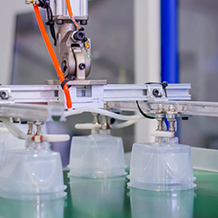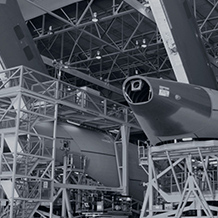
Smart story
What makes smart manufacturing so cool?
A conversation with Michelle Davis, manager at Deloitte Consulting
Today we're hanging with Michelle Davis.
Hey, hey!
So, can you please tell us a little about your background and journey?
It actually started when I was interning—I helped deploy a custom constraint visualization and prioritization production tool that focused client efforts on tackling the most important issues first, which reduced the span of the overall production build approximately 15%. We developed a cloud-based dynamic scheduler for a client from start to finish. To me, that's pretty cool.
What was your first smart factory project?
It combines a lot of the techy side of things that play to my strengths: the quantitative components and data-driven decision-making that I really enjoy, the functional focus on how we can improve our customer's operations and ultimately transform the way that they build and deliver aircraft or other end products.
What is the impact of using dynamic scheduling technology?
Agility and utilization! We have a saying here: Your perfect optimized plan is outdated in less than five minutes, because the production environment is changing that quickly. It's affected by factors like who showed up today? What material is available? What engineering or quality holds exist? And because work is changing at such a rapid pace, it's challenging to understand and incorporate all of those variables manually. What you get, then, is a “best guess” or a “best as of 6 a.m. this morning” schedule with teams reacting to all of the changes that keep popping up.
By using dynamic scheduling technologies, you can actually force-rank everything you have in the shop by priority and prompt teams to work on the most important available task they can perform.
OK, let's talk about the future of smart factory. What gets you excited?
It's still so new with a lot of growth potential. How we've solved problems in one sector won't work exactly the same way in another. Additional computational power and technologies make things we couldn't do years ago achievable now, and I expect that trajectory to continue.
I'm also excited to bring smart factory thinking to new industries. Deloitte has a lot of smart factory experience in heavy industrial products, but what about in life sciences and health care? What about in food and beverage? It's exciting to think about the unique challenges of each industry and client and how to go about solving them.
You're also a big believer in The Smart Factory @ Wichita.
Yes, because there's been a lot of talk about smart manufacturing—what it can do, how it'll change everything. But I think it's important to get out of your own factory and come see what's possible—on a live production line. And that's what we have here. Seeing is believing.
What do you want people to take away from their visit to the SF@W?
I want them to believe! That they can start to build and scale a smart factory solution now—today. Not just someday. Deloitte's done a great job of getting key players on board. You can have intelligent conversations about your specific challenges with them. It's an amazing ecosystem, a “who's who” of smart manufacturing.
You can really see the potential of smart manufacturing technology, can't you?
Ha, well, I got my B.A. in graphic design and fine arts, with an emphasis on painting. So I've always been about seeing what's possible—looking beyond what exists, to what could be. And today, I get to tell everyone about all the amazing things smart factory technologies can do for them. #dreamjob!
Sounds like you've always been good at painting a beautiful picture.
Ha, thanks, I try!

